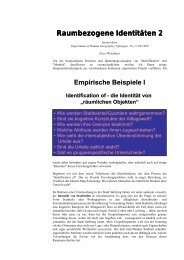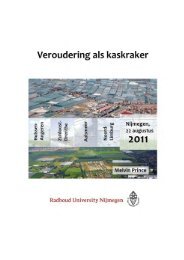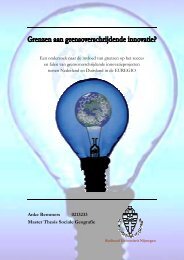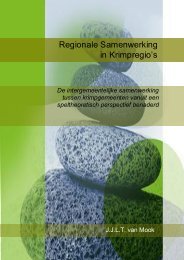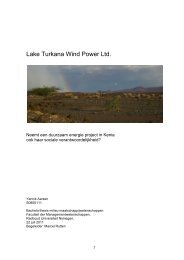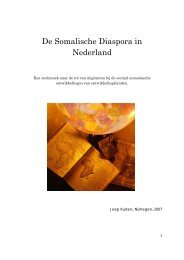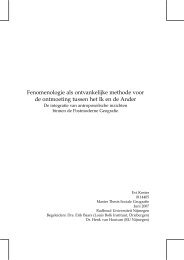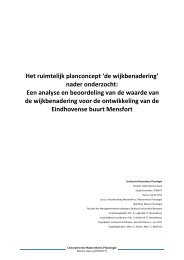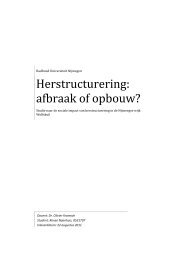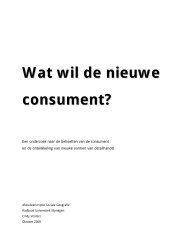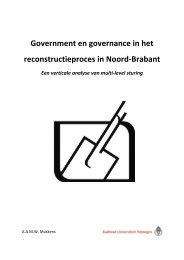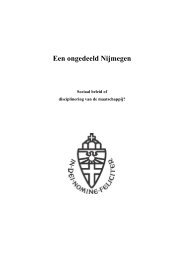Trading with the enemy in Mitrovica, Kosovo. - RUhosting
Trading with the enemy in Mitrovica, Kosovo. - RUhosting
Trading with the enemy in Mitrovica, Kosovo. - RUhosting
Create successful ePaper yourself
Turn your PDF publications into a flip-book with our unique Google optimized e-Paper software.
CHAPTER 6: RESULTS<br />
Views on <strong>the</strong> effects of <strong>in</strong>ter-ethnic trade of experts <strong>in</strong> <strong>Kosovo</strong>.<br />
“When a man's got money <strong>in</strong> his pocket he beg<strong>in</strong>s to<br />
appreciate peace”.<br />
-Per un pugno di dollari / A fistful of dollars (1964).<br />
The previous chapter discussed how some Albanians and Serbs improved <strong>the</strong>ir relations <strong>with</strong> members of<br />
<strong>the</strong> o<strong>the</strong>r ethnic group after engag<strong>in</strong>g <strong>in</strong> contact <strong>with</strong> <strong>the</strong>m over longer periods of time. Long term <strong>in</strong>ter-<br />
ethnic contact was shown to ei<strong>the</strong>r improve relations and remove stereotypes <strong>in</strong> <strong>the</strong> best scenarios, while <strong>in</strong><br />
<strong>the</strong> worst scenarios it did not really lead to any change. In general, <strong>the</strong> image was quite positive. It was also<br />
discussed how <strong>in</strong>ter-ethnic contact is forbidden <strong>in</strong> most of <strong>Kosovo</strong> and especially <strong>in</strong> <strong>Mitrovica</strong>, except when<br />
<strong>the</strong>re is money <strong>in</strong>volved. People understand how everyone has to make a liv<strong>in</strong>g and <strong>with</strong> <strong>the</strong> scarceness of<br />
jobs it is accepted to have <strong>in</strong>ter-ethnic contact when this makes a liv<strong>in</strong>g. Now does <strong>in</strong>ter-ethnic trade have <strong>the</strong><br />
possibility of contribut<strong>in</strong>g to better relations between Albanians and Serbs <strong>in</strong> <strong>Mitrovica</strong> as well?<br />
6.1. Money and self-<strong>in</strong>terest<br />
The first and most important th<strong>in</strong>g that trade achieves beneficial to an improvement of <strong>in</strong>ter-ethnic relations<br />
is contact across <strong>the</strong> ethnic boundaries. This is hardly disputable as it is happen<strong>in</strong>g all over <strong>Mitrovica</strong>. The<br />
reason why <strong>in</strong>ter-ethnic trade is happen<strong>in</strong>g is - quite simply - money. Money and personal <strong>in</strong>terest <strong>in</strong> general<br />
offer a strong <strong>in</strong>centive to engage <strong>in</strong> <strong>in</strong>ter-ethnic contact <strong>in</strong> <strong>Mitrovica</strong>, despite <strong>the</strong> difficulties associated <strong>with</strong><br />
it. Apparently all <strong>the</strong> pressures from politics, <strong>the</strong> media, negative stereotypes, grievances, <strong>enemy</strong> images and<br />
<strong>in</strong>tra-community rules are not strong enough to <strong>with</strong>stand this drive towards <strong>in</strong>terest.“It's always strange <strong>in</strong><br />
<strong>Mitrovica</strong>: even <strong>the</strong> most radical Serbs have Albanian friends if it gives <strong>the</strong>m benefits” respondent #2, a Serb<br />
<strong>in</strong>volved <strong>in</strong> politics <strong>in</strong> North <strong>Mitrovica</strong> says. He believes that when people have a common <strong>in</strong>terest this<br />
forces <strong>the</strong>m to rise above ethnic difficulties and just work toge<strong>the</strong>r and is conv<strong>in</strong>ced that his own change <strong>in</strong><br />
relations <strong>with</strong> Albanians - by work<strong>in</strong>g for an <strong>in</strong>ternational NGO - had a lot to do <strong>with</strong> money. Because he<br />
received a good salary he could justify his relations <strong>with</strong> Albanians for himself <strong>in</strong> <strong>the</strong> beg<strong>in</strong>n<strong>in</strong>g, later some<br />
of <strong>the</strong>se relations evolved <strong>in</strong>to friendships. Respondent #2 believes it would have been a lot better for<br />
reconciliation if all <strong>the</strong> money from reconciliation projects had been <strong>in</strong>vested <strong>in</strong>to <strong>the</strong> old m<strong>in</strong>e <strong>in</strong> <strong>the</strong> north<br />
and factory <strong>in</strong> <strong>the</strong> south, <strong>the</strong> m<strong>in</strong><strong>in</strong>g complex called Trepça. In this scenario people from <strong>the</strong> different ethnic<br />
groups would need to work toge<strong>the</strong>r to earn money and this is why he believes it would work as a<br />
mechanism for improv<strong>in</strong>g relations: people would get to know each o<strong>the</strong>r on a personal level. He is curious<br />
why <strong>the</strong> <strong>in</strong>ternational community never organized a jo<strong>in</strong>ed company <strong>in</strong> <strong>Kosovo</strong> (mean<strong>in</strong>g <strong>with</strong> both Albanian<br />
and Serbian employees). He po<strong>in</strong>ts out that Germany and France were never forced to reconcile after <strong>the</strong><br />
second world war but reconciliation happened anyway, and very fast, because it was <strong>in</strong> <strong>the</strong>ir best <strong>in</strong>terest<br />
(respondent #2). The Albanian director of an NGO noted that although all Serbs do not recognize <strong>the</strong><br />
68



